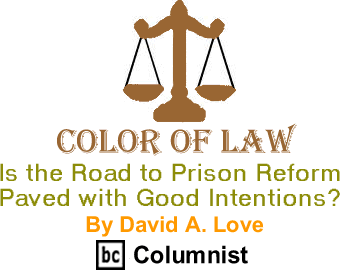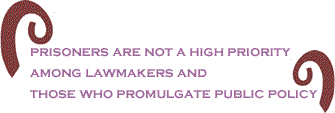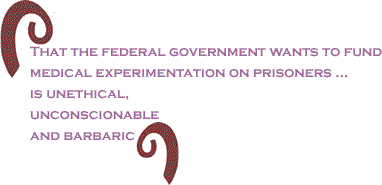
|
|||||||||||||||||||||
|
||||||||||
|
||||||||||
|
The current issue is always free to everyone If
you need the access available to a |
||||||||||

|
||||||||||
 |
||||||||||
|
The nationwide problem of prison overcrowding provides a perfect opportunity for society to examine real prison reform. Exorbitant prison spending threatens to cripple state budgets, as lawmakers in many parts of the country allocate more funding to lock up their citizens than to educate them and provide them with essential services. With over 2.2 million people incarcerated in its federal, state and local institutions, no other country imprisons as many of its people per capita - or in absolute numbers for that matter - as the United States. As a result of failed policies driven by the politics of fear and racial scapegoating - the war on drugs, tough-on-crime measures, and draconian sentencing guidelines — America's prisons are an emerging national crisis. After spending years forsaking the concept of rehabilitation in our criminal justice system, in favor of retribution for its own sake, we know that the system is overburdened and overwhelmed. And many have concluded that the old ways are not serving us well. In California, the three-strikes rule and a powerful corrections officers' union have created a burgeoning prison population. Over 172,000 prisoners are housed in 33 facilities designed for only 100,000, costing the taxpayers more than $8 billion annually. Inmates do not receive adequate healthcare, and recidivism is high. A three-federal judge panel will determine if the California prison system requires a population cap, releasing thousands of inmates and alleviating the deplorable overcrowding.
Meanwhile, the California Department of Corrections and Rehabilitation recently announced a new policy that would free thousands of nonviolent parolees who are unlikely to re-offend. The program would remove certain parolees from supervision after six months rather than the usual three years. And ex-convicts who are no longer under the supervision of the system cannot be sent back to prison for violation of parole. And similarly, Pennsylvania Governor Ed Rendell is proposing alternative sentencing for nonviolent drug offenders, including early release, drug treatment, and recidivism prevention programs. This, as the Keystone State faces a crisis of prison overcrowding, with a legacy of tough sentencing and life without parole that has broken up families and ravaged poor communities, yet has done nothing to address the troubling homicide rate in cities such as Philadelphia. As the least regarded among society, prisoners are not a high priority among lawmakers and those who promulgate public policy. And many believe that prisoners deserve any punishment they receive above and beyond their prison sentence. But in order to halt the revolving door of recidivism that plagues our prison system, society must pay attention to the civil rights and quality of life of prisoners and strive to rehabilitate them. The purging of religious and spiritual materials from prison libraries on the grounds that blocking inmates' access to such books will stem the spread of terrorism - as reported in the New York Times on September 10, 2007 - is misguided and unconstitutional. That the federal government wants to fund medical experimentation on prisoners — following a report last year by the Institute of Medicine, part of the National Academy of Sciences, which recommended a return to such practices — is unethical, unconscionable and barbaric.
Although they are deprived of their liberty, prisoners are entitled to the same basic constitutional rights we all share. However, the Prison Litigation Reform Act of 1996 (PLRA), enacted by Congress ostensibly to put an end to frivolous prison litigation, has crippled inmates' ability to seek redress and protect their rights in the federal courts. The PLRA requires:
The PLRA is a roadblock for valid claims of prisoner abuse, and must be repealed. And when prisoners are released, they are subjected to punishment above and beyond their original sentence. Ex-cons lose their right to vote in some states, cannot obtain licenses for certain professions, and are denied financial aid for college because they have a felony conviction. It is difficult for these individuals - predominantly of color and mostly poor, unskilled and uneducated - to rebuild their lives and support their families when society stands in their way. America is at a crossroads on the issue of prison reform. Locking our problems away has not made society whole. The failed "law and order" stance must give way to a smarter and more thoughtful approach that examines and tackles the interrelated problems of poverty, low education, joblessness and crime. We cannot continue on a path that does not address the root causes of America's ills, fails to reduce crime, and bankrupts us - not only economically, but spiritually and socially - in the process. David A. Love is an attorney based in Philadelphia, and a contributor to the Progressive Media Project and McClatchy-Tribune News Service. He contributed to the book, States of Confinement: Policing, Detention and Prisons (St. Martin's Press, 2000). Love is a former spokesperson for the Amnesty International UK National Speakers Tour, and organized the first national police brutality conference as a staff member with the New York-based Center for Constitutional Rights. He served as a law clerk to two black federal judges. Click here to contact Mr. Love. |
||||||||||
| October
11,
2007 Issue 248 |
|
| Printer Friendly Version in resizeable plain text format format |
 |
 |
 |
| |
| |


































